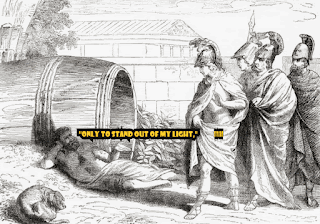Explore the history behind Cynic philosophy and discover what makes it unique among ancient worldviews. Read on to learn more about this fascinating branch of knowledge!
Exploring the Origins of Cynic Philosophers and Their Philosophy
Cynicism is an ancient philosophy that emphasizes the pursuit of virtue through self-control, personal integrity, and autonomy in spite of life's hardships. This school of thought explored a variety of topics such as morality, justice, and honor to name a few. Learn more about the Cynics philosophy and its impact on later generations here!
What is Cynic Philosophy?
Cynic philosophy is a school of thought focused on living in accordance with nature. Its practitioners aimed to lead an authentic life that resists external influence and cultivates an unyielding sense of personal autonomy. Utilizing strict reason as its moderate, this ancient system of belief sought to rid the world of a variety of vices, including pride, greed, and ignorance.
Differences between Stoic and Cynic Philosophy.
One of the main differences between stoic and Cynic philosophy is that stoicism is more yielding and forgiving as it embraces a more constructive approach to life challenges. It emphasizes the concept of a ‘good life’ living within a moral framework by accepting external circumstances, striving towards inner peace, embodying moral integrity, and adhering to an autonomy-based set of morals. In contrast, Cynic philosophy denounces social conventions and focuses heavily on individualism to lead the most fulfilling existence without any attachments or constrains.
The Origin of Cynicism and the Early Cynics.
Cynicism derives from the Ancient Greek era, beginning around 400 BC with Antisthenes. He was a student of Socrates and his primary tenant of thought prescribed that virtue was the only good and should be sought at all costs. After Antisthenes, Diogenes further developed these ideas into what we better recognize today as cynicism. This prominent figure preached a simpler, more austere lifestyle devoid of customary society trappings and customs. He placed emphasis on personal freedom, material frugality, critiques of conventionalism, and living in harmony with nature.
THE relation of intellectually eminent men to contemporary society has been very different in different ages. In some fortunate epochs they have been on the whole in harmony with their surroundings suggesting, no doubt, such reforms as seemed to them necessary, but fairly confident that their suggestions would be welcomed, and not disliking the world in which they found themselves even if it remained unreformed.
At other times they have been revolutionary, considering that radical alterations were called for, but expecting that, partly as a result of their advocacy, these alterations would be brought about in the near future. At yet other times they have despaired of the world, and felt that, though they themselves knew what was needed, there was no hope of its being brought about. This mood sinks easily into the deeper despair which regards life on earth as essentially bad, and hopes for good only in a future life or in some mystical transfiguration.
What is the meaning of cynic
who don't care about world. In simple words I tell you that ''If you have watch the the jungle book cartoon then you have heard this ''bare necessities'' song.
.gif) |
| This beer is cynic |
''Look for the bare necessities , The simple bare necessities''
''If you get everything then why are you worried, forget the world and live happy life.
founder of cynicism were Antisthenes 400 BCE, Diogenes 412-323 BCE, Crates of Thebes 365- 285 BCE.
From Socrates to the Cynics
''What a lot of things that I don't need.'' - Socrates.
when he went to market place then he said '' what a lot of things, that I don't need.'' This is basic philosophy of Cynics. We can't get happiness in material world but we can get happiness through nature. Cynics want to live like a primitive age man.
Cynic philosophers hate gold. Why is Gold yellow ? because of Gold is afraid and everybody want to fight for gold and control gold.
What is Cynicism and Who Were the Cynic Philosophers?
Cynicism is an ancient school of philosophy founded by the philosopher Antisthenes in ancient Greece. He was a disciple of Socrates, yet diverged entirely from his teacher’s views, rejecting metaphysics and instead spoke of living a life based on morality and self-control as the most important virtues for success. His followers came to be known as Cynic philosophers who focused their teachings on achieving true happiness through minimal material possessions, free will, and lack of dependence on social conventions. Consequently, the Cynic philosophers emphasized living life according to nature rather than following societal norms.
They disliked work. They don't do job. They begged for food. They lived in poverty. one of the cynic said I could eat raw meat. One day the Priest lecture the Cynic philosopher on what happened after death. He said after death you get everything. Cynic philosopher said to the Priest , so you die. When the priest caught the thief in the temple, the cynic philosopher said that one thief caught another thief. They are against of Greeks religion.
 |
| Antisthenes |
Cynics Antisthenes
He associated with working men, and dressed as one of them. He took to openair preaching, in a style that the uneducated could understand. All refined philosophy he held to be worthless; what could be known, could be known by the plain man. He believed in the "return to nature," and carried this belief very far. There was to be no government, no private property, no marriage, no established religion. His followers, if not he himself, condemned slavery. He was not exactly ascetic, but he despised luxury and all pursuit of artificial pleasures of the senses. "I had rather be mad than delighted," he said.
Antisthenes believed that virtue can be taught, and requires nothing but the ‘strength of a Socrates’, that is, courage and self-command. Virtue is ennobling, he said; it expresses itself in deeds and requires few words. Anyone good deserves to be loved, and how one acts should be dictated by the laws of virtue whether or not they conform to the laws of the polis. These two latter views are such as an outsider would be well placed to form: Antisthenes was a nothos, or ‘bastard-born’, because his parents were not married (his mother was moreover a Thracian), so he did not have Athenian citizenship.
Antisthenes embraced poverty and the ascetic life, and it was claimed that the symbols of adherence to Cynicism – a ragged cloak, a staff and a ‘wallet’ or small bag – originated with him (some say, with Diogenes). The idea that the only thing you need by way of a bed is a folded cloak is certainly attributed to him.
 |
Diogenes the cynic
Diogenes the Cynic, as noted, took the idea of spurning convention and living ‘according to nature’ to its limit. Born in 412 BCE at Sinope on the Black Sea, he lived for nearly ninety years, dying in 323 BCE. It appears that life did not begin well for him, because he suffered banishment from Sinope for a crime: his father ran the mint in that city, and father and son were together convicted of debasing the coinage.
Diogenes the dog
Diogenes meets alexander
 |
| Diogenes and alexander |
Diogenes barrel
Diogenes stories
The teaching of Diogenes was by no means what we now call "cynical"--quite the contrary. He had an ardent passion for "virtue," in comparison with which he held worldly goods of no account. He sought virtue and moral freedom in liberation from desire: be indifferent to the goods that fortune has to bestow, and you will be emancipated from fear. In this respect, his doctrine, as we shall see, was taken up by the Stoics, but they did not follow him in rejecting the amenities of civilization.
Diogenes philosophy
Impact of the Cynics on Western Culture Today.
cynicism philosophy quotes
- ''Philosophy is to care for nothing.''
- ''Love of money is the mother - city of evils.''
- One day Diogenes longed for the sweet and got it but he threw. Because of ''Refraining from pleasure is pleasure.'' - Diogenes.
- “It is not that I am mad, it is only that my head is different from yours.”
- “Alexander the Great found the philosopher looking attentively at a pile of human bones. Diogenes explained, "I am searching for the bones of your father but cannot distinguish them from those of a slave.”
- “Of what use is a philosopher who doesn't hurt anybody's feelings?”
- “It is the privilege of the gods to want nothing, and of godlike men to want little.”
- “In a rich man's house there is no place to spit but his face.”
- “I am a citizen of the world.”
- “A philosopher named Aristippus, who had quite willingly sucked up to Dionysus and won himself a spot at his court, saw Diogenes cooking lentils for a meal. "If you would only learn to compliment Dionysus, you wouldn't have to live on lentils."
- Diogenes replied, "But if you would only learn to live on lentils, you wouldn't have to flatter Dionysus.”
- “The foundation of every state is the education of its youth.”
- “It takes a wise man to discover a wise man.”
- “Blushing is the color of virtue.”
- “I have nothing to ask but that you would remove to the other side, that you may not, by intercepting the sunshine, take from me what you cannot give.”
- “When some one reminded him that the people of Sinope had sentenced him to exile, he said, "And I sentenced them to stay at home.”
- “Dogs and philosophers do the greatest good and get the fewest rewards.”
- “The art of being a slave is to rule one's master.”
- “Poverty is a virtue which one can teach oneself.”
- “Once he saw the officials of a temple leading away some one who had stolen a bowl belonging to the treasurers, and said, "The great thieves are leading away the little thief.”
- “To one who asked what was the proper time for lunch, he said, "If a rich man, when you will; if a poor man, when you can.”
- “No man is hurt but by himself”
- “When people laughed at him because he walked backward beneath the portico, he said to them: "Aren't you ashamed, you who walk backward along the whole path of existence, and blame me for walking backward along the path of the promenade?”
- “What I like to drink most is wine that belongs to others.”
- “The only way to gall and fret effectively is for yourself to be a good and honest man.”
- “Behold! I've brought you a man.”
- “I am Diogenes the Dog. I nuzzle the kind, bark at the greedy and bite scoundrels.”
- “As a matter of self-preservation, a man needs good friends or ardent enemies, for the former instruct him and the latter take him to task.”
- “Cuanto más conozco a la gente, más quiero a mi perro.”
- “If I gained one thing from philosophy is that at the very least, I am well prepared to confront any change in fortune.”
- “No man is hurt but by himself.”
- “You are a simpleton, Hegesias; you do not choose painted figs, but real ones; and yet you pass over the true training and would apply yourself to written rules”
- “The insult dishonors the one who infers it, not the one who receives it.”
Bibliography
A History of Western Philosophy Book by Bertrand Russell
The-history-of-philosophy-by-a.-c.-grayling

Comments
Post a Comment